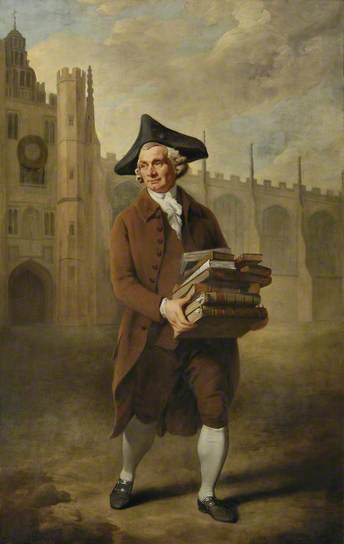
One of them locals
Every July, about forty students and three professors from the Torrey Honors Institute take a trip to Cambridge for an intensive four-unit class. It’s Torrey Cambridge, and it’s a blast.
The curriculum each summer is anchored in a short book of the New Testament, and includes about ten books by authors with a Cambridge connection: locals.
This year we will be focusing on the book of Ephesians, and exploring its presentation of the depths of the gospel. That theme of depth –a metaphor for wisdom, insight, and powerful reflection, together with personal growth and the cultivation of underdeveloped personal and social possibilities– is all over Ephesians, and we use the local authors to goad us into conversing our way together into it.
We read the curriculum via e-books, a format which is oh so horrible but ah so portable, and for a summer trip abroad, the portability outweighs (giddit?) the horribility.
Here’s the drool drool booklist:
Charles Simeon’s Sermons on Ephesians. We read 18 of the 42 Ephesians sermons from Simeon’s Horae Homileticae. Dunno who Simeon was? Take a peek at this little booklet (also assigned).
William Perkins, The Art of Prophesying. How to preach or be preached to. Our textual link to the great Puritan heritage of Cambridge.
Erasmus, Manual of a Christian Knight (The Enchiridion). The textual hook for reading this is that it’s based on the armor of God from Ephesians 6, but Erasmus goes in a lot of directions with it.
Samuel Taylor Coleridge, Aids to Reflection (Selections). “Especially designed for the studious young at the close of their education” with a view to increasing their “power of thinking connectedly –especially on the scheme and purpose of the Redemption by Christ.” Hardest book on the list, sorry.
John Milton, Samson Agonistes. The master of the Christian epic turns his hand to biblical tragedy.
Sylvia Plath, Ariel. Plath as a Cambridge student took the exam called “the Tragedy Paper;” her late poems still manifest that academic formation.
C.S. Lewis, An Experiment in Criticism. We all know Lewis was an Oxford man deep down. But for almost a decade he was a Cambridge professor, and it was a very productive period. So when in Cambridge we read things he wrote in Cambridge. We use this late piece of literary criticism to help us learn to read, period.
C.S. Lewis, Letters to Malcolm, Chiefly on Prayer. Written late and published posthumously, this book of fictional letters let Lewis teach without didacticism and preach without preachification.
C.S. Lewis, The Silver Chair. Okay, here we just cheated (Lewis published the book a year or two before taking the Cambridge professorship), but this book is big fun and pairs very well with Ephesians.
Shakespeare, Romeo and Juliet. Don’t hurt yourself trying to figure out how this is Cambridgey; it isn’t. We go see a play at Shakespeare’s Globe in London every summer, and R&J is what’s on. Also Shakespeare was really Marlowe, so.